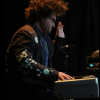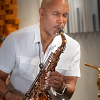Home » Jazz Articles » Album Review » Ada Bird Wolfe: Odd Bird
Ada Bird Wolfe: Odd Bird
Normally, one associates the University of Chicago with intellectual depth rather than performance art, but in this case, the story is the song, the lyrics are the story, and the lyrics are far from conventional. Ada Bird Wolfe, a U of C graduate in an interdisciplinary course linking philosophy and psychology, has obviously got the intellectual chops to do this kind of recording, and enough vocal chops (if not Nina Simone level) to persuade people to listen. The angular, jagged rhythms of the compositions are the first thing one notices, as well as the crystalline piano of Jamieson Trotter, the reeds of Scott Mayo, and the infinite variations that the rhythm section of Dan Lutz and Peter Buck serve up. It gets going with "Odd Bird Bop," and does not let up. Bop? Ok, bop for intellectuals.
"In the Shade" is a tune for anyone who has ever lived in a torrid zone: "it is hot, we will lie, while the sweet time drifts by." Hard to imagine an ode to climate change, but here it is. "Something Fast, Something Light" is just that, spinning off a twisting flute. "Ericolloquy" somehow brings Eric Dolphy's "Straight Up and Down" to mind, haunting in spirit, featuring another sinuous flute solo. "Ashes, Ashes" ostensibly dates back to the Great Plague and London Fire of 1665 but is based on a much more recently contrived catastrophe, the California wildfires. It is, to say the least, evocative, swinging into 4/4 as Wolfe questions "Can we get away?" "Lover's Leap" is a postmodern "In the Wee Small Hours of the Morning," unexpected and a little more representative of our current condition. "With a leaping fearless boy, perhaps my heart can mend." Good luck, one thinks, as the tune ends on an all too certain tonic. "The Wave" is a metaphor for life, or drowning, or both. A "Samba Batucada" is Afro-Brazilian, and very fast paced, and an upbeat counter to "Did I Ever," which is about a busted love affair, and poignant. "Ordinary Man" is what it is, to use a contemporary refrain. Listen, please. There is more to this meditative recording, reflective without being attitudinizing. Whether its style, outlook or introspective turn is for you is a matter of personal preference. Whether or not, it is a sensitively realized and provocative work of art.
Track Listing
Odd Bird Bop; In The Shade; Something Fast, Something Light; Ericolloquy; Ashes, Ashes; Lover's Leap; The Wave; Samba Batucada; Did I Ever; Ordinary Man; Ocean, Mountain, River, Sky; An Egg.
Personnel
Ada Bird Wolfe
vocalsJamieson Trotter
pianoScott Mayo
woodwindsPeter Buck
drumsDan Lutz
bass, acousticAlbum information
Title: Odd Bird | Year Released: 2023 | Record Label: Self Produced
Tags
PREVIOUS / NEXT
Support All About Jazz
 All About Jazz has been a pillar of jazz since 1995, championing it as an art form and, more importantly, supporting the musicians who make it. Our enduring commitment has made "AAJ" one of the most culturally important websites of its kind, read by hundreds of thousands of fans, musicians and industry figures every month.
All About Jazz has been a pillar of jazz since 1995, championing it as an art form and, more importantly, supporting the musicians who make it. Our enduring commitment has made "AAJ" one of the most culturally important websites of its kind, read by hundreds of thousands of fans, musicians and industry figures every month.
























